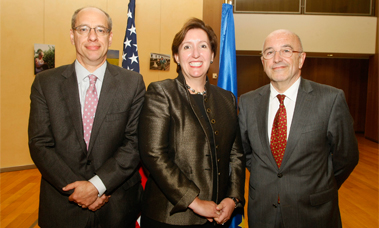The Federal Trade Commission, Department of Justice, and the European Commission today issued an updated set of “best practices” that they use to coordinate their merger reviews. The agencies also celebrated the 20th anniversary of the United States-European Union bilateral antitrust agreement.
Following their annual antitrust consultations earlier today, Jon Leibowitz, Chairman of the FTC, Sharis A. Pozen, Acting Assistant Attorney General for the Department of Justice’s Antitrust Division, and Joaquín Almunia, European Union (EU) Vice-President and Competition Commissioner, praised the success of the cooperation agreement, and noted that international coordination and cooperation have steadily increased over 20 years. The agencies reaffirmed their commitment to cooperation and coordination in order to benefit consumers and business.
The 1991 agreement, which was signed in Washington, D.C. on September 23, provided for mutual notification of enforcement activities affecting each other’s important interests; exchange of non-confidential information and regular meetings among the agencies; cooperation and coordination of enforcement activities; consideration of requests by one party to pursue enforcement activities against anticompetitive conduct affecting the interests of the requesting party; and taking into account at all stages of enforcement, the important interests of the other party.
“Over the last two decades we’ve learned a lot about how to work together to preserve competition and protect consumers on both sides of the Atlantic, while at the same time enabling firms to pursue their mergers and acquisitions without undue delay,” said FTC Chairman Leibowitz. “These updated best practices will ensure that we continue these efforts effectively and efficiently.”
“In a world of multiple competition regimes, the strength of the U.S.-E.U. relationship and the depth of cooperation between the U.S. agencies and the European Commission serve as a model for the sound enforcement of competition laws,” said Acting Assistant Attorney General Pozen. “The revised best practices on U.S./E.U. merger cooperation are a prime example of how our working relationship will go forward with cooperation, trust and respect as its guiding principles. I have no doubt that our relationship will continue to grow, building on the 20 years of cooperation under the ground-breaking bilateral agreement of 1991.
The best practices, originally issued in 2002, provide an advisory framework for interagency cooperation when one of the U.S. agencies and the European Commission’s Competition Directorate review the same merger. The revised U.S.-E.U. best practices:
- Provide more guidance to firms about how to work with the agencies to coordinate and facilitate the reviews of their proposed transactions;
- Recognize that transactions that authorities in the U.S. and Europe review may also be subject to antitrust review in other countries; and
- Place greater emphasis on coordination among the agencies at key stages of their investigations, including the final stage in which agencies consider potential remedies to preserve competition.
The heads of the three agencies also marked the U.S.-E.U. cooperation agreement’s anniversary by hosting a high-level symposium reviewing 20 years of U.S.-E.U. competition agency cooperation on Oct.13, 2011.
 At the 20th anniversary of the U.S.-E.U. Cooperation Agreement, from left to right: Jon Leibowitz, Chairman of the FTC, Sharis A. Pozen, Acting Assistant Attorney General for the Department of Justice’s Antitrust Division, and Joaquín Almunia, European Union (EU) Vice-President and Competition Commissioner. |
The symposium brought together many senior officials who were responsible for the adoption of the 1991 agreement, with present and former senior officials from all three agencies, along with leading academic experts, practitioners, and business executives from both jurisdictions. The symposium highlighted the agreement’s success in expanding communication and understanding among the agencies; enlarging the scope of cooperation and coordination in merger, cartel and single-firm conduct investigations; coordinating approaches to global antitrust developments; pursuing convergence on better procedures and substantive analysis; and helping to overcome the rare difference in outcomes.
The symposium also reflected on the future of transatlantic cooperation in a global economy with more than 120 competition agencies, and how U.S.-E.U. cooperation might serve as a model in the global context.
The United States also has cooperation agreements with: Australia, Brazil, Canada, Chile, China, Germany, Israel, Japan, Mexico, and Russia.
